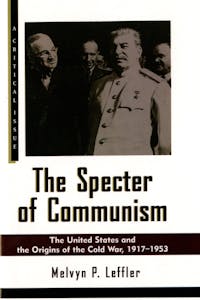The Specter of Communism
The United States and the Origins of the Cold War, 1917-1953
 Download image
Download image
ISBN10: 0809015749
ISBN13: 9780809015740
Trade Paperback
160 Pages
$26.00
CA$35.25
The Hill and Wang Critical Issues Series: concise, affordable works on pivotal topics in American history, society, and politics.
The Specter of Communism is a concise history of the origins of the Cold War and the evolution of U.S.-Soviet relations, from the Bolshevik revolution to the death of Stalin. Using not only American documents but also those from newly opened archives in Russia, China, and Eastern Europe, Leffler shows how the ideological animosity that existed from Lenin's seizure of power onward turned into dangerous confrontation. By focusing on American political culture and American anxieties about the Soviet political and economic threat, Leffler suggests new ways of understanding the global struggle staged by the two great powers of the postwar era.
Reviews
Praise for The Specter of Communism
"A wonderfully succinct analysis, illustrating the interaction of geo-politics, economics, culture, ideology, and personality in bringing about the Cold War. There could hardly be a better introduction to the subject."—John Lewis Gaddis, Ohio University"
"Leffler has spent much of a distinguished career pondering his subject; connoisseurs and neophyte nippers both will benefit, albeit differently, from the distillate he serves up here."—H.W. Brands, Journal of American History
"Leffler probes the ideological, political, and economic underpinnings of U.S. foreign policy toward the Soviet Union from 1917 to 1953 with laser-sharp intelligence, bringing more understanding to the sources of U.S. conduct of world affairs than any comparable volume."—Martin J. Sherwin, Dartmouth College
"A brief but thoughtful essay outlining the terrible misapprehensions that led to escalating tensions between the US and the Soviet Union from the close of WW II to the end of the Korean conflict. Although anti-Bolshevik feelings ran high even at the time of the Russian Revolution, fear of the USSR didn't dominate American foreign policy until after WW II. Drawing on materials newly available from Soviet, East European, and Chinese archives, Leffler (winner of the 1993 Bancroft Prize for A Preponderance of Power) deftly traces the history of US-Soviet relations in precis, from the Bolsheviks' rise to power through the uneasy truce in Korea. Beginning as an ideological clash, the tension between the two nations only gradually became a power struggle as well. Indeed, it was only when the USSR became a player on the same global scale as the US (albeit considerably weaker in key strategic areas after the pounding it took during WW II) that the Soviets were perceived as an active threat abroad. On the other hand, seen through the distorting mirror of obsessive anti-Communism, domestic American radicals were regarded as a danger almost from the first murmur of the word 'Bolshevik' in the popular press, and it was the specter of homegrown subversion rather than foreign invasion that haunted American policies for a long time. Leffler retells this often familiar material methodically, using the new documentation to reveal Stalin as hesitant and tentative in foreign policy, primarily concerned with erecting a security buffer around Russia rather than building an evil empire. The portrait that emerges is of two superpowers-in-formation engaged in a grim dialogue of the deaf, with terrible consequences for humanity . . . This is an admirably complete introduction to the history of the Cold War."—Kirkus Reviews
Reviews from Goodreads
BOOK EXCERPTS
Read an Excerpt
The Specter of Communism
( 1 )
THE BACKGROUND 1917-1941
FROM the beginning, there was an ideological clash. When the Bolsheviks seized power in Russia in November 1917, in the midst of World War I, they appealed...


